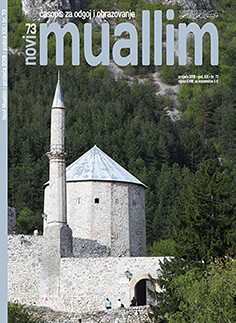PRAVNI STATUS ISLAMSKIH ZAJEDNICA U NJEMAČKOJ
THE LEGAL STATUS OF ISLAMIC COMMUNITIES IN GERMANY
Author(s): Bilal HodžićSubject(s): Public Law, Islam studies, Canon Law / Church Law
Published by: Rijaset Islamske zajednice u Bosni i Hercegovini
Keywords: Islamic communities; religious societies; recognised religious communities; public law corporation;
Summary/Abstract: There are two categories of religious organisations in Germany registered regarding different legal bases: I – private law associations (citizen associations) registered with aim at realisation of religious activities. II – public law corporations which enjoy far more legal rights than the first mentioned registered communities. Islamic communities (jamaats) use the first, private law association, category as the only way to register their religious communities. That is to say that not a single Islamic community is registered as a religious community (Religionsgemeinschaft), in a real sense of the word, thus none have the status of public law corporation (Körperschaft des offentlichen Rechts). The present way of organisation and registration grants Islamic communities a right to: property ownership, establishing a place for religious rituals, religious teachings within the Islamic centres, contract agreements, employment of imams etc. Whereas communities registered as public law corporations have far more legal rights, such as: collecting the membership fee as the form of taxes, establishing and maintaining hospitals as well as kindergartens, educational institutions (primary and secondary schools and faculties); these rights further include a right to participate in ethical commissions on federal and state levels, right to have their own space in public RTV services and regulative commissions, to have independent control of their own cemeteries, to have constitutionally granted right to have their activity space within the army, public institutions, hospitals and prisons; furthermore to have right to participate in social processes and right to have officials of religious communities treated as state officials who have direct authority for religious studies subject in schools etc. The efforts of Islamic communities to achieve the status of a legally recognised religious community (Religionsgemeinschaft) or to get a status of a public law corporation have, so far, not produced any results. This is partially due to a number of legal impediments and partially due to the fact that Muslims do not have a very long history in Germany. However if Islamic communities do achieve this status they will then enjoy the same rights that are presently enjoyed by Christian, Jewish, Ahmediyya, Bahai and other religious communities. This issue has been discussed for quite some time within the Conference about Islam (Deutsche Islamkonferenz – DIK) which is organised with the help of German government. It is evidently in the state interest to have adequately organised Islamic communities as this would make the cooperation with state organs easier and will give a clear picture as of who is representing Muslims in Germany. In this article we present some facts regarding this issue, we discussed requirements that need to be fulfilled as well as obstacles on the path of gaining the status of a fully recognised religious community that is public law corporation, a status not yet given to any of the Islamic communities in Germany. This places Islamic community into an unequal position with other religious communities that do enjoy this status.
Journal: Novi Muallim
- Issue Year: 2018
- Issue No: 74
- Page Range: 76-84
- Page Count: 9
- Language: Bosnian

